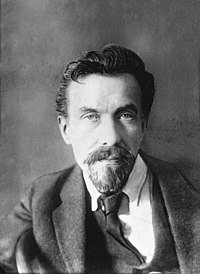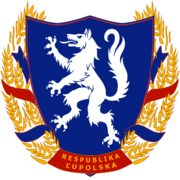Lev Gincburg: Difference between revisions
Jump to navigation
Jump to search
No edit summary |
No edit summary |
||
| Line 14: | Line 14: | ||
|office1 = Chairman of the Communist Party of Luepola | |office1 = Chairman of the Communist Party of Luepola | ||
|deputy1 = [[ | |deputy1 = [[Gavril Krčelić]]<br>[[Alan Vučić]] | ||
|premier1 = [[Alan Vučić | |premier1 = [[Alan Vučić]]<br>[[Stanislav Kolar]] | ||
|term_start1 = 1 March 1894 | |term_start1 = 1 March 1894 | ||
|term_end1 = 21 February 1916 | |term_end1 = 21 February 1916 | ||
Revision as of 16:51, 17 September 2020
This article is incomplete because it is pending further input from participants, or it is a work-in-progress by one author. Please comment on this article's talk page to share your input, comments and questions. Note: To contribute to this article, you may need to seek help from the author(s) of this page. |
Lev Gincburg | |
|---|---|
 | |
| President of Luepola | |
| In office 16 April 1901 – 27 December 1905 | |
| Prime Minister | Ernest Šintić Alan Vučić |
| Preceded by | Hrvoje Radić |
| Succeeded by | Office Abolished Himself (As Chairman of the Communist Party of Luepola) |
| Chairman of the Communist Party of Luepola | |
| In office 1 March 1894 – 21 February 1916 | |
| Premier | Alan Vučić Stanislav Kolar |
| Deputy | Gavril Krčelić Alan Vučić |
| Preceded by | Nikola Ceranić |
| Succeeded by | Stanislav Kolar |
| Personal details | |
| Born | Leonid Ben-Shahar Gintzburg 5 June 1853 Aneska, Aneska, Luepola |
| Died | 21 February 1916 (aged 62) Prishek, People's Republic of Luepola |
| Political party | Communist Party of Luepola |
| Spouse | Tihana Magdeka Gincburg |
| Alma mater | University of Obránse |
Lev Gincburg (Luepolan: [ˈlev ˈgintsbuɾg]; 5 June 1853 – 21 February 1916) was a Luepolan politician and Communist demagogue of Isheri descent who is most widely known for bringing the Communist Party to power in the First Republic of Luepola and transforming it into the into a Communist state during his rule as President. His variations of Flecques' ideals that were implemented during his rule served as a blueprint for the governance and administration of future Communist countries.
